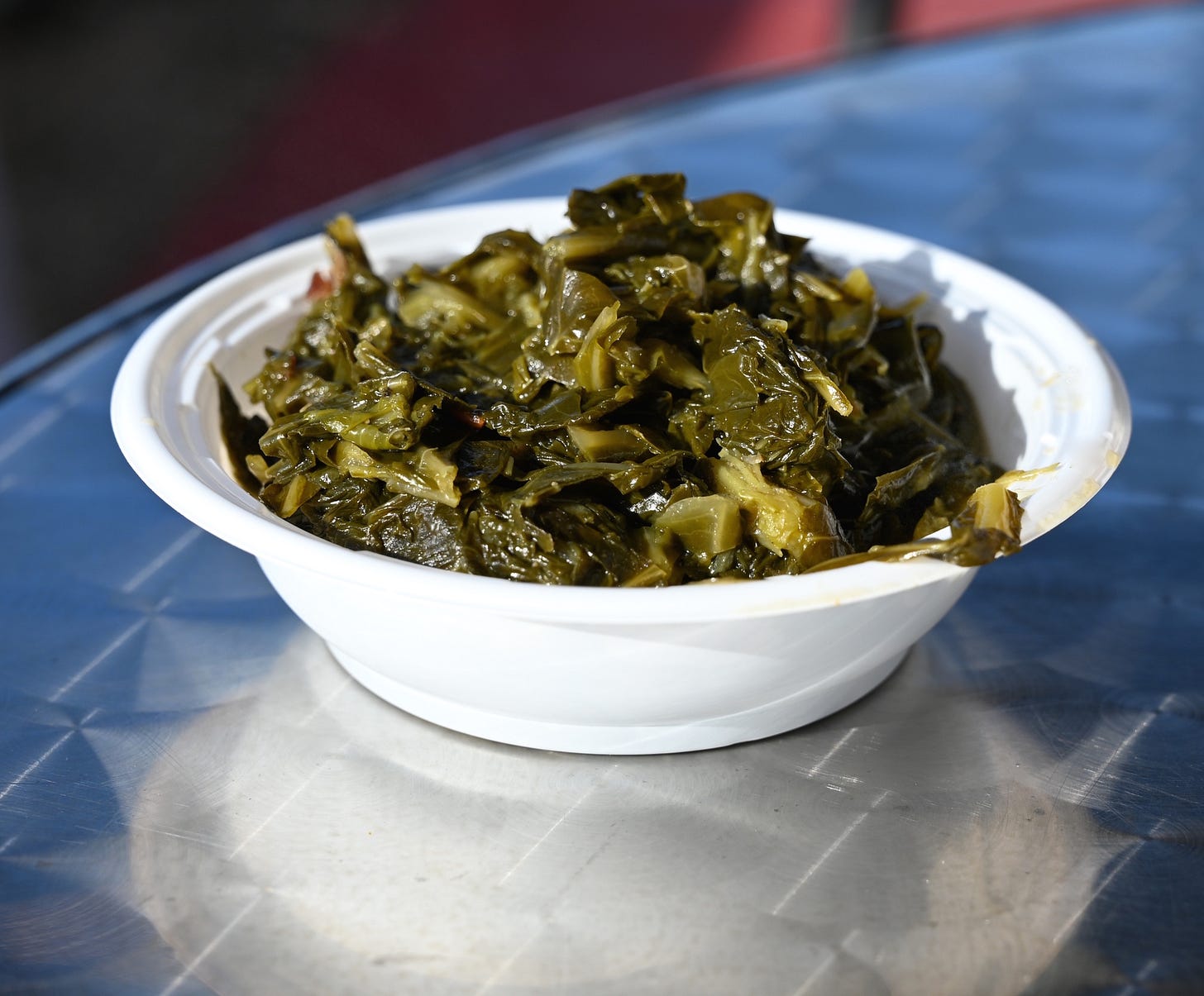How To Make Collard Greens
This is how to make collard greens.
This is how to make collard greens. First, my grandfather drives his truck to the Alemany Farmer’s Market. My grandfather chooses a bunch of taut, bitter leaves, and he puts money in the dirt-caked, stubby-fingered hand of the farmer who planted the seeds, and he brings home the collards to my grandmother to cook.
But where does my grandfather get the money to buy the collards? Well, first, my grandfather buys a ticket on a slow bus from outside Pine Bluff, Arkansas. He sits in the back because it’s 1943, and he’s leaving Arkansas because he has to sit in the back of the bus there. The bus takes him to San Francisco, and he gets a job mixing concrete, and then another, better job, and a foreman’s job, and one day it is 1985 and he is a senior supervisor for the Department of Public Works who makes more money than he has ever made, and he has a wife who has never had to work, who makes the very best collard greens.
But, then, where does his wife come from? It starts with a man named Newman Ingram, whose face I have never seen, who is born in South Carolina of two slaves born in Africa. Newman begets a son whose name I do not know with another slave named Chaney, and that son begets another son named Terrell, whose face I have never seen, with a woman named Charlotte, and they have a son, Neely, the first one of these born a free man. (I have seen Neely’s weary, broad face in his sole surviving photograph.) And Neely and his wife, the haughty creole Amanda Duncan, have a son, Augusta, who will break his mother’s heart and his wife’s heart and his daughter’s heart.
Augusta and his several brothers are high-yellow men, some of whom can get by riding the front of the bus in cities where no one knows about their dark-skinned father, some of whom disappear forever and are presumed to be passing. That magic high-yellow skin supposedly makes Augusta better than his dark-skinned wife Mary and his pretty little brown daughters, but when his liver fails and he turns a deep golden yellow from the bile it just makes him dead. And that is how you get my grandmother, who takes the train to San Francisco with her aunts after every last one of those people dies before she is sixteen.
Maybe Martha’s aunt Irene, who will one day own a restaurant, will teach her to make good collards. That will be later, after Irene and her sisters abandon their teenaged niece in San Francisco, after sixteen-year-old Martha changes her name to Barbara and marries her hard-working boyfriend, who had been a concrete mixer operator and will one day buy her a big house at the base of Twin Peaks with a kitchen just right for making collards.
The kitchen has a big window over the double sink, framed with frilly curtains. My grandmother will soak the collards well in the left-hand sink. My grandfather is peeling and cutting up potatoes with a huge sharp butcher knife, so he’ll just go over and drain the collards and cut the rubbery leaves from their thick stems while my grandmother blanches the ham hocks for the greens.
My grandmother will put the collards in one of the bigger pots, and they will cook down slow with the ham hocks. When the collards are tender and limp, my grandmother will make cornbread and an iceberg salad with apples and carrots, and my grandfather will have turned the potatoes into thick, soft home fries in the same skillet where he has just fried some pieces of chicken. And I will sit down at the kitchen table, my melamine plate piled high with food, and tear at a chicken drumstick and home fries and cornbread with margarine and grape jelly, and pause at the collards only to carefully pick out and devour all the little shreds of ham hock and completely ignore the bitter, wilted, silky greens, luminous with pork fat.
And when I am done there will be a sad lonely pile of collard greens on the plate, but my grandparents won’t make me eat them.
I tried to explain how to make collard greens but it may be impossible. My grandmother is gone forever and my grandfather doesn’t eat pork anymore. And, worst of all, I rarely ate collards when given the opportunity, being in it for the ham hocks. Still, I am going to blanch some ham hocks and pile some wilted greens in a pot and try my best. I will serve them on a melamine plate to my son and daughter, who have never seen my grandmother in the flesh, who have never been to Pine Bluff but are of Pine Bluff, not Ingrams but of Ingrams, have washed their hands in my grandparents’ double sink, and meet their hard-working great-grandfather in his truck all over San Francisco. They will probably not like collards yet but that is probably beside the point.



